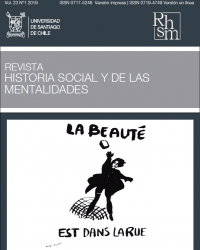THE FEMINISMS OF THE LATE 60s IN THE UNITED STATES
RADICALS, DISSIDENTS AND ASSIMILATIONISTS
DOI:
https://doi.org/10.35588/rhsm.v23i1.3567Keywords:
Feminisms, Sixty, United States, DebatsAbstract
The sudden turn of feminisms towards the end of the 60s, observable in its new programs, strategies of visibility and forms of organization, accounts for a ‘68 different, powerful and fragmentary at the same time. A ‘68 that has, at this point, its most pressing center in the Women’s Lib of the United States where the liberal and radical feminist movements are linked and discuss with currents of black power, gay power and hippism. In this work we propose a possible panning of this complex and bellicose scene between 1966 and 1972, reviewing some of the debates, limits and becomings of these exploded feminisms.
Downloads
References
Amorós, Celia y de Miguel Álvarez, Ana, compiladoras. Teoría feminista: de la ilustración a la globalización. Tomo II. Minerva, 2007. https://doi.org/10.5944/empiria.15.2008.1206.
Brown, Elaine. A Taste of Power: A Black Woman's Story, Pantheon Books, 1992.
Brownmiller, Susan. “Sisterhood Is Powerful”, New York Times, 15 de marzo de 1970. https://www.nytimes.com/1970/03/15/archives/sisterhood-is-powerful-a-member-of-the-womens-liberation-movement.html.
Casullo, Nicolás. París ’68. Las escrituras, el recuerdo y el olvido. Manantial, 1998.
Davis, Angela. Mujeres, raza y clase, Akal, 2005.
De Beauvoir, Simone. All said and done. Marlowe and Company, 1972.
De Lauretis, Teresa. “When lesbians were not women”. Labrys. Études feminists, Número especial, septiembre de 2003, pp. 23-54.
Duberman, Martin. Stonewall. Penguin, 1993.
Echols, Alice. Daring to Be Bad: Radical Feminism in America, 1967-1975. University of Minnesota Press, 1989.
Eagleton, Terry. Marxismo y literatura, Paidós, 2013.
Feldman, Jacqueline. “De FMA au MLF”. Clio. Histoire‚ femmes et sociétés, n° 29, 2009, pp. 193-203. https://doi.org/10.4000/clio.9326
Firestone, Shulamith. La dialéctica del sexo. En defensa de la revolución feminista. Kairós, 1976.
Flexner, Eleanor. Century of Struggles: The Women’s Rights Movement in the United States. Belknap Press, 1996.
Fraser, Nancy. Fortunas del feminismo. Traficantes de Sueños, 2015.
Friedan, Betty. La mística de la feminidad. Universidad de Valencia, 2016.
Gimeno, Beatriz. Historia y análisis político del lesbianismo. La liberación de una generación. Gedisa, 2007.
Giorgi, Gabriel. “Política de la supervivencia”, Kamchatka, Revista de análisis cultural, n° 10, diciembre 2017, pp. 249-260. https://doi.org/10.7203/kam.10.10634
Hanisch, Carol. “What can be learned. A Critique of Miss America Protest”, 27 de noviembre de 1968. Redstockings. First Literature List and a Sampling of Its Materials. https://www.redstockings.org.
Jabardo, Mercedes, “Desde el feminismo negro, una mirada al género y a la inmigración”, Feminismos en la antropología: nuevas propuestas y críticas, coordinan, Liliana Suárez Navaz, Emma Martín Díaz y Rosalva Aída Hernández Castillo, Ankulegi, 2008, pp. 39-54.
Freeman, Jo. “The BITCH Manifesto”, mayo de 1968. https://www.jofreeman.com/joreen/bitch.htm.
Lavander Menace, “The woman identified woman”, 1 de mayo de 1970. https://doi.org/10.2307/j.ctvf3w44b.50.
Love, Heather. Feeling backward. Loss and the Politics of Queer History. Harvard University Press, 2007.
Mérida Jiménez, Rafeal ed. Manifiestos gays, lesbianos y queer. Testimonios de la lucha (1969-1994). Icaria, 2009.
Millett, Kate. Política sexual, Universidad de Valencia, 1995.
New York Radical Women. “No More Miss America Manifesto”, 7 de septiembre de 1968. http://www-personal.umich.edu/~mlassite/discussions261/missamerica.html
National Organization for Women. “Statement of Purpose”, 29 de octubre de 1966. https://now.org/about/history/statement-of-purpose/
Ranciére, Jacques. El compartir de lo sensible, Prometeo, 2014.
Redstockings. “No more Miss America Manifesto”, 7 de septiembre de 1968. http://www-personal.umich.edu/~mlassite/discussions261/missamerica.html
Redstockings. “Who are the experts?”. Some media and other reponses to two Redstockings abortion speakouts; 1969 and 1989. https://doi.org/10.2307/j.ctvf3w44b.49
Redstockinsg. “The pseudo-left/lesbian alliance against feminism”, Femimist Revolution. An Abridged Edition with Additional Writings, Random House, 1978.
Restockings. “Redstockings Manifesto”, 6 de julio de 1969: https://www.redstockings.org/index.php/rs-manifesto
Rivera, Sylvia y Johnson, Marsha. Acción Travesti Callejera Revolucionaria. Supervivencia, revuelta y lucha trans antagonista. Cuadernos Lumpen, 2016.
Rosen, Ruth. The World Split Open: How the Modern Women’s Movement Changes America, Tantor, 2013.
Rubin, Gayle. Desviations. John Hope Franklin Center, 2011.
Rubin, Gayle. En el crepúsculo. La teoría como justicia erótica. Bocavulvaria, 2018.
Stack, Carol. “Roles sexuales y estrategias de supervivencia en una comunidad negra urbana”, Feminismos negros. Una antología, editora Mercedes Jabardo, Traficante de Sueños, 2012.
Williams, Raymond. La política del modernismo. Contra los nuevos conformistas. Manantial, 1997.
Women International Terrorist Conspiracy from Hell. “Manifiesto W.I.T.C.H”, octubre de 1968. En WITCH, Textos, Comunicados y Hechizos (1968-1969). La Felguera, 2007.
Downloads
Submitted
2018-12-09Published
Versions
- 2024-06-03 (2)
- 2019-10-19 (1)
Issue
Section
License
Copyright (c) 2019 Revista de Historia Social y de las Mentalidades

This work is licensed under a Creative Commons Attribution-NonCommercial-NoDerivatives 4.0 International License.













